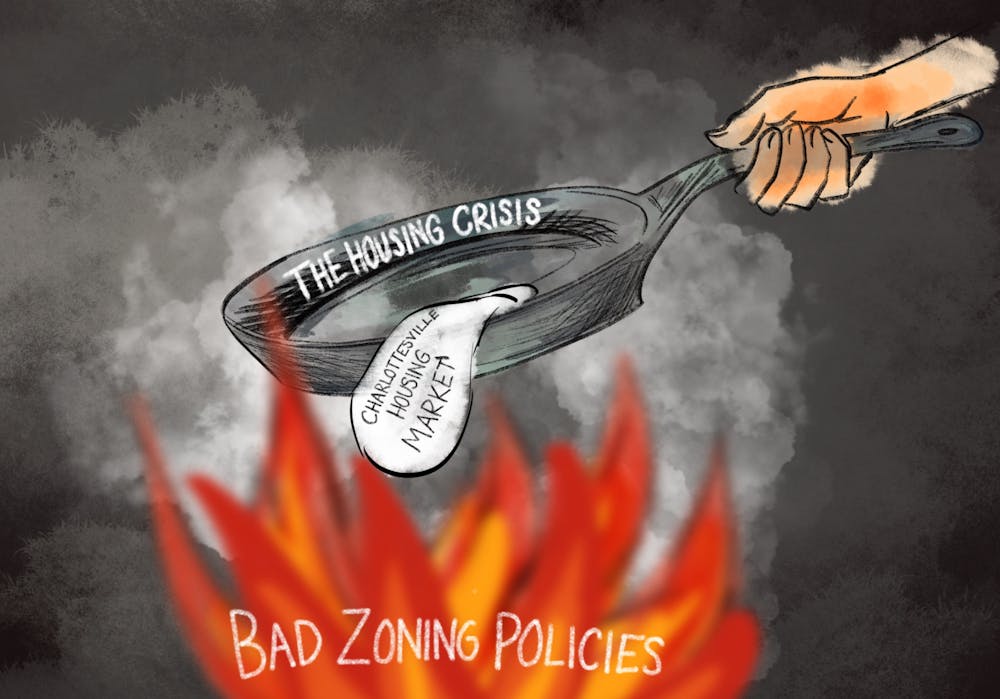The Charlottesville City Council is at the center of a tug-of-war, pulled by demands to increase housing availability for students on one side and a desire to curb gentrification on the other. In this struggle, they have produced an innovative solution to the housing problem — allowing pockets of high-density growth closer to Grounds targeted for students, like the new student-centered housing complex on Jefferson Park Avenue. However, their new draft of a zoning ordinance threatens to negate the positive effects of this progressive solution by allowing high-density buildings — which house multiple families in a unit — to permeate single family neighborhoods. Charlottesville has an affordable housing problem, and the proposed zoning allocations and rent controls are not the solution. Rather, doubling down on efforts to concentrate student housing near the University will prove beneficial to everyone in the Charlottesville housing market.
Charlottesville is a college town through and through, and one with a fairly affluent student population. This reality contributes to a housing market where the financial capacity of the students and those of the local residents are vastly different. This is the root of the housing market problems in Charlottesville — University students continue to want to move off-Grounds and into the community, putting students in direct competition with local renters. This is a losing battle for local renters because students possess a greater price tolerance. As a result, housing costs in Charlottesville have risen 25 percent since 2021, while median household income remains relatively stable — meaning that residents are less and less able to afford housing. The cost of living in Charlottesville is 3 percent higher than the state average and 7 percent higher than the national average. Local residents are simply unable to tolerate the higher rent that the students can, creating a situation where wealthier residents move into a neighborhood, pushing rent up and previous residents out — contributing to gentrification.
Charlottesville City Council has claimed it is attempting to address this growing housing crisis, primarily through the recent zoning ordinance that will come to a vote later this year. The proposed ordinance includes provisionals requiring high-density buildings to implement rent control on a portion of their units to make them affordable. Beyond these provisionals, this readjustment of building code is problematic because of the way it permits developers to increase the presence of high density buildings. In particular, community members have voiced concern regarding the Council’s intent to increase residential density in what are currently single-family neighborhoods.
It should be abundantly clear that the proposed ordinance will not accomplish its publicized goal of making Charlottesville housing more affordable and deterring gentrification. Allowing high-density residences to be built where they did not previously exist is part of what created this housing crisis in the first place. As for rent control, a large majority of economists agree that stumping rent growth is generally bad for both residents and the local economy. Rent control disincentivizes real estate firms that would have provided new housing — why would a firm enter a market that limits the amount of money it could make? This takes a chunk out of potential tax revenue for the city. Additionally, controlling rent reduces the ability that landlords have to maintain upkeep as prices rise due to inflation, and as a result, the quality of rent-controlled buildings often slips. Again, the proposed changes by City Council include such rent control provisions, in addition to the aforementioned increases in high density buildings. This means we have fallen out of the frying pan of rising housing costs and into the fire of misguided zoning policies and rent control.
While it may not be feasible now to altogether oppose any new high-density buildings, the City should focus on allowing new high-density residences to be constructed closer to Grounds, continuing their innovative work that began with allowing the new housing complex on JPA. This process would create spaces for students to live in areas that are especially convenient for them, while limiting direct competition with the wider Charlottesville housing market. Without students driving rent up past permanent tenets’ limits, the fast-paced widening of the gap between housing prices and income would have a better chance to be slowed, while still creating an environment that encourages construction growth to match student demand.
It is critical that we as students consider the role we play in the broader, multifaceted Charlottesville community. We are responsible for making sure our four years here do not lay undue financial burdens on the people living here permanently. The City Council can help prevent students from making a negative impact by adjusting its zoning policy — a permanent policy of allowing pockets of increased student housing is the solution Charlottesville needs.
Paul Kurtzweil is an Opinion Columnist who writes about Economics, Business and Housing for The Cavalier Daily. He can be reached at opinion@cavalierdaily.com.







